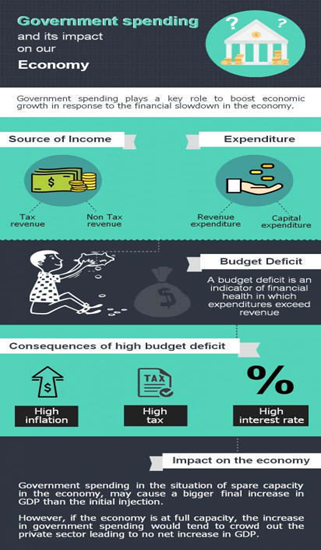

Context
With the global economic scenario and slowing down demand in advanced economies with continued aggressive monetary tightening by central banks, the States’ effective investments can ramp up their spending which will have a critical bearing on the pace of the Indian economy.
About
The States and Expenditure:
- The States’ ability to ramp up capital expenditure and take advantage of the fiscal space can become a key determinant of the aggregate fiscal impulse to the economy at this time in the country.
- The analysis has been made among growing state economies including Andhra Pradesh, Gujarat, Haryana, Karnataka, Kerala, Madhya Pradesh, Maharashtra, Punjab, Rajasthan, Tamil Nadu, Telangana, Uttar Pradesh, and West Bengal — that account for 85 percent of India’s GDP.
How State Expenditure can help for growing Economy?
In response to the financial slowdown and its impact on the economy, the government plays a key role by increasing its spending to boost economic growth. Some of the roles include;
- Provides a well-functioning legal and political system: Any economy facing political or economic turmoil is not conducive to economic growth since it has very little trust in the economy. Moreover, there is uncertainty in the economy and people are also unwilling to invest.
- Lays regulatory role to provide a competitive market: There should be certain regulations to ensure that the economy does not drift to a monopolistic situation. The government needs to think about trade policies with foreign countries, regulations on natural resources available in our country, etc.
- Stimulate the economy by increasing government spending: This was one of the philosophies given by one of the renowned economists John Maynard Keynes. He was of the view that the government’s role is very important “when the economy is in recession or depression-like situation and the government should increase spending to have a pickup in the economic activity.”
Impact of government spending on the economy
- Rise in Expenditure and Growth: There is a high possibility that the rise in taxes will negate the impact of rising government spending which would leave Aggregate Demand (AD) However, it is possible that increased spending and a rise in tax could lead to an increase in GDP.
- During downfalls in the economy: In a recession, consumers may reduce spending leading to an increase in private sector savings. Therefore a rise in taxes may not reduce spending as much as usual.
- The Multiplier Effect: Increased government spending may create a multiplier effect. If government spending causes the unemployed to gain jobs then they will have more income to spend leading to a further increase in aggregate demand. In these situations of spare capacity in the economy, government spending may cause a bigger final increase in GDP than the initial injection.
Possible implications:
- Can crowd out Private sector lending: However, if the economy is at full capacity, the increase in government spending would tend to crowd out the private sector leading to no net increase in Aggregate demand from switching from private sector spending to government sector spending.
- Inappropriate allocation of funds: Some economists would argue increasing government spending through higher taxes would lead to a more inefficient allocation of resources as governments tend to be less effective in spending money.
- Increase in Off-budget Borrowings: The off-budget borrowings by states refer to loans taken by its entities, special purpose vehicles, etc., which are expected to be serviced through the state government’s own budget, instead of the cash flows or revenues generated by the borrowing entity.
|
The Union government has recently clarified that henceforth; off-budget borrowings would be considered as borrowing of the state government and would be subject to the provisions of Article 293(3) of the Constitution of India. |

